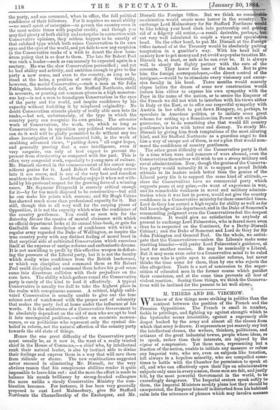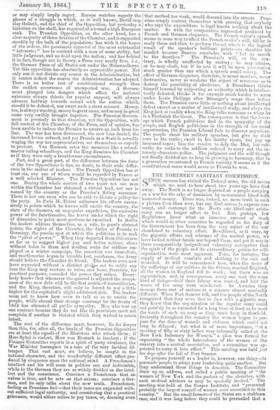M. TRIERS AND DR. VIRCHOW.
WE know of few things more striking in politics than the contrast between the position of the French and the Prussian Oppositions. The French is small in number, feeble in privilege, and fighting up against strength which to the bystander seems irresistible against a supremely able despot backed by the army and almost all the classes from which that army is drawn. It represents as yet scarcely any but the intellectual classes, the writers, thinkers, politicians, and. artisans of the great industrial towns, people whose ideas, so to speak, rather than their interests, are injured by the riginw of compression. Yet these men, representing but a fraction of the nation, unable to initiate any measure or refuse any Imperial vote, who are, even on subjects like taxation, left always in a hopeless minority, who are compelled some- times to battle with the Chamber for permission to speak at all, and who can effectively open their lips on administrative subjects only once in everysession, these men are felt, and justly felt, by the most powerful Government in the world, to be exceedingly dangerous. The Imperial orators speak softly to them, the Imperial Ministers modify plans lest they should be exasperated, the Emperor himself is disturbed from his habitual calm into the utterance of phrases which may involve menace or may simply imply. regret. Europe watches eagerly the phases of a struggle in which, as it well knows, David may slay Goliath, and the chief of the Opposition, but yesterday a historian on the shelf, has regained at a bound a high European rank. The Prussian Opposition, on the other hand, has a clear majority of three-fourths of the Chamber, and is supported steadily by the bulk of the population; has with it the hopes of the ardent, the passionate approval of the most substantial " interests ; " has to contend with a man of some ability, but little judgment, and no hold upon the nation; and has behind it in fact, though not in theory, a Press very nearly free, i. e., the German Press of all States not under the Hohenzollerns. Yet this opposition has absolutely no appreciable power. Not only can it not dictate any course to the Administration, but it cannot deflect the course the Administration has adopted. There is no better test of constitutional strength than the sudden occurrence of unexpected war. A Govern- ment plunged into dangers which affect the national existence always thirsts for popular support, will always advance halfway towards accord with the nation which, should it be defeated, can exact such a stern account. Money, too, is always wanting, money in great sums, and money in great sums very swiftly brought together. The Prussian Govern- ment is preeisely in that situation, yet the Opposition, with full control of the Chamber, of the Press, and of opinion, has been unable to induce the Premier to swerve an inch from his line. The war has been denounced, the new loan denied, the increased levies refused, and yet Prussia as a State is actually waging the war her representatives set themselves so eagerly to prevent. Von Bismark rates the members like a school- master rating schoolboys, and the King dismisses his Chamber as if they were only a troublesome encumbrance.
Part, and a great part, of the difference between the force of the two Oppositions is due, no doubt, to their wide differ- ence in the matter of leaders. The French Opposition has at least six, any one of whom would be regarded by France as a well selected Minister. The Prussian Opposition has not one. During the whole contest of two years not one man within the Chamber has obtained a virtual lead, not one is named by the. country as the Premier's fitting successor. There is not one even who can be said to dictate a p-olicy-for the party. In Paris 11. Tillers addresses his efforts succes- sively to points which he knows will excite the country, the state of the finances, an unpopular expedition, the excessive power of the functionaries, the terror under which the right of discussion in priut must perforce be exercised. In Berlin the leaders address themselves, as a rule, to purely abstract points, the rights of the Chamber, the duties of Prussia to Germany, the precise spot at which the politician is to seek the "pivot of power." When they departed from this course so far as to suggest higher pay and better rations, shoes without holes in them and woollen socks for soldiers em- ployed on a winter campaign, the sensation was immediate, and reactionaries began to tremble lest, perchance, the Army should believe the Chamber its friend. The leaders even now have separated without a distinct pledge not to ratify any loan the King may venture to raise, and have, therefore, for practical purposes, conceded the power they refuse. Every- body knows that whenever the quarrel is adjusted the accept- ance of the new debt will be the first article of reconciliation, and the King, therefore, will only be forced to pay a little higher for the capitalist's slight additional risk. The leaders seem not to know how even to talk so as to excite the people, while abroad their strange contempt for the treaty of 1852 has alienated all public sympathy. Men who tear up one contract because they do not like its provisions must not complain if another is violated which they wished to retain intact.
The root of the difference must, however, lie far deeper than this, for, after all, the heads of the Prussian Opposition are at least the equals of the Ministers who attack them ; if Herr Sybel is violent, Herr von Bismark is insolent ; if the Finance Committee reports in a spirit of party virulence, the War Minister harangues in a tone of the very feeblest ill- temper. That root must, we believe, be sought in the national character, and the wonderfully different effect pro- duced by eloquence upon the national mind. A Frenchman's intellect and his will seem in polities one and indivisible, while in the German they are as widely divided as the intel- lect and the conscience. Convince a Frenchman that an axiom is true, and he acts on that axiom; convince a Ger- man, and he only talks about the new truth. Frenchmen, feeling as Prussians feel—that their taxes are expended with- out sufficient legal authority, and considering that a practical grievance, would either refuse to pay taxes, or, deeming even that method too weak, would descend into the streets. Prus- sians simply content themselves with proving that anybody who says the expenditure is legal knows nothing about the matter. So with the comparative impression produced by French and German eloquence. The French orator's speech seems in some way to affect the French reader's will, till he is ready there and then to perform the act which is the logical result of the speaker's brilliant points—to shoulder his musket because Denton concludes with "Let us march to the frontiers." The Prussian's will, on the con- trary, is wholly unaffected by oratory ; he may admire, or he may chafe, but if he acts it will be upon provocation much greater than any which a speech could convey. The effect of German eloquence, therefore, is never mordant, never destructive, never so weakens the object of reverence as to destroy the possibility of obedience. A Frenchman thinks himself lowered by supporting an authority which is intellec- tually defeated, thinks it for example much harder to serve under Louis Philippe after B6ranger's songs than before them. The Prussian cares little or nothing about intellectual defeat except as a matter of intellectual study, and obeys the King just as readily when the King talks nonsense as when he is a Frederick the Great. The consequence is that the lever- age which French politicians find in the sympathy of the people, and English politicians in the strength of our social organization, the Prussian Liberal fails to discover anywhere. The people cheer his military speeches, but give up their sons to the ranks ; exult in his thrifty views, but pay up increased taxes; hiss the resolve to defy the Diet, but sub- scribe for socks to the soldiers ordered to carry out the in- tensely obnoxious policy. The judgment and the will though not finally divided are so long in growing to harmony, that to a generation accustomed to French rapidity it seems as if the constitutional cause would never in Prussia be won.































 Previous page
Previous page